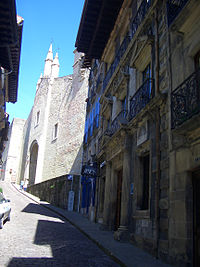Hondarribia (Spanish: Fuenterrabía) is a fishing town in the province of Guipuzcoa, Basque Country of Spain on the Bay of Txingudi, by the border with France. It is the last remaining walled town in Guipuzcoa.

Understand
editHondarribia has been settled since the time of the Romans, and became a full-fledged village in the 13th century. As a town historically on the border, whether between Navarre and Castille, or between Spain and France, Hondarribia has enjoyed a tumultuous past. After citizens sought protection under the Castilian crown in 1203, Hondarribia became a point of conflict between Castille and the kingdom of Navarre, supported by France. The town was repeatedly besieged by French and Navarran forces throughout the 1300s up until the Thirty Years' War in the mid 1600s, when Spain and France reconciled their borders under the Treaty of the Pyrenees. After the signing of this treaty (which fixed the French border to its current state), Hondarribia remained a border town, across the Bay from France.
There are two sections of town that are of special interest to the traveller:

- The old city — With its medieval walls still intact, the historic part of town is home to the castle of Charles V, Zuloaga Palace, Casadevante Palace, the gothic church of Nuestra Señora del Manzano, and Calle Pampinot, among other sights.
- La Marina — full of multicoloured houses and their resident fishermen, along San Pedro and Santiago Streets.
Hondarribia's beach, ports, lighthouse, the beach of Ondarraitz (on the other side of the bay), and the neighbouring hillsides are just as attractive, and make it clear why Hondarribia has enjoyed its position as a vacation destination for more than 100 years.
Get in
editHondarribia is across the river from Hendaye, 4 km from Irún, 15 km from San Sebastian, and 20 km from Biarritz, France. It is well-connected to these cities by bus or ferry (in the case of Hendaye)
By car
editHondarribia is 15 km from San Sebastian and 20 km from Biarritz. Further away are Bilbao (100 km), Pamplona (80 km), and the region of La Rioja (120 km). It is accessible by the A8 Autopista and the N1 highway.
By plane
edit- San Sebastian airport is in Hondarribia. Lurraldebus serves the airport every 15-30 minutes.
- Biarritz airport, which is frequented by Air France, Ryanair, and other airlines, is 20 km away.
By train
editHondarribia does not have a railway station, however there are many connections to Irún and Hendaye, both of which are major railheads.
- Irún Train Station, served by RENFE and EuskoTren, is 4 km away and is served by a frequent bus service.
- Hendaye (France) train station is served by SNCF and is the southern end of a TGV line. It is 5 km away.
By bus
editHondarribia is only served by local buses going to Irún or San Sebastian. From there, bus lines fan out through all of Spain, either at Irún's train station or at San Sebastian's bus station.
By boat
editThere is a small and frequent ferry to Hendaye, run by Jolaski[dead link] (in Spanish/French)
Get around
editSee
edit- Military Tattoos (Alarde de Armas). Early September. A civilian-military city parade commemorating the victory over the largest siege by French troops led by the Prince of Condé on Sept 8, 1638. The victory is attributed to support of Guadalupe Virgin, patron saint of Hondarribia. A spectacular show involving most of the local population from morning time to about 23:00. 20 groups walk around the streets wearing traditional red berets, and plays fifes and drums--the same melody again and again. Young girls in traditional costumes head each group. One of the group is made of woodmen wearing sheep skin caps. The rest of the population are applauding to all of them in support. It's virtually impossible to drive into the town during the event, and all pintxos bars are heavily overcrowded till the very closing time.
Do
editBuy
editEat
editPintxos
editHondarribia is on par with San Sebastian and Bilbao as a gourmet destination of the Basque country.
- Yola Berri, Calle Zuloaga / San Pedro Kalea 22 (across the street from Jáuregui Hotel), ☏ +34 943 642-780, +34 943 645 611. Open and offering pintxos from 11:00. One of the most cited places for pintxos in the town.
- Gran Sol, Calle San Pedro, 65, ☏ +34 943 64 27 01. Kitchen closes before 23:00. Second most cited places for pintxos. Won many gastronomic awards for creativity in pintxos. Has both a bar full of tapas and a more formal restaurant for having a dinner. Pintxos €1.40-2.40, main courses €5.10-10.35.
- Enbata, San Pedro 22 (at the Jáuregui Hotel). Kitchen closed after 23:30.
- Txantxangorri.
- Itxaspe.
Dining
editBudget
edit- Horixe, c/Santiago 45, ☏ +34 943 640-455. Pizza and other quite touristic dishes. One of the few places you can eat during the mass city events like the city parade. Nothing special in the rest of the year. Main course: about €8-11.
Mid-range
edit- Sebastian, Calle Mayor (downstairs). Closed Su and Tu in November. Has a fireplace.
- Restaurant Suggari (under Bixente Muñoz's baton (Gran Sol Bar) in the same location as Hotel Rio Bidasoa), ☏ +34 943 643 123. Fine dining restaurant, specialising in local produce with an alfresco eating area.
Splurge
edit- Alameda. Closed Su and M, and beginning of Oct and Jan. Michelin star restaurant.
- Arroka Berri. Closed Sunday nights, Tuesdays and the whole of February.
Drink
editSleep
editMid-range
edit- Hotel Río Bidasoa, Nafarroa Behera, 1, ☏ +34 943 645408, reservas@hotelriobidasoa.com. A very good option. Quiet location with a wonderful garden (eating breakfast on the patio is wonderful). Friendly and courteous staff. €80-100.
Splurge
edit- [dead link] Hotel Pampinot, C Mayor 5 (Casadevante palace), ☏ +34 943640600, info@hotelpampinot.com.
- Parador de Hondarribia. Located in the old castle of King Charles V. €200 (low season), €372 (high season).
